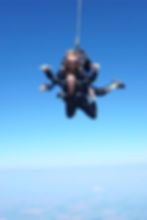Skydiving Is more Fun than Scary!
- Joe Sketti
- Nov 21, 2022
- 4 min read
Yep, scary fun! Skydiving is an inherently scary experience, but how scary is it really? Well, it's scary in a different sense as you may think; I wouldn't describe it as "fear for your life" scary, but rather as a fear of the unknown. Consider this: as we get older, we do things less often for the first time. 5 years old, everything is new and exciting, but 25 years old, not so much.
A first skydive (and seeing the world from 2 miles up suspended by a harness and parachute) rejuvenates the sense of curiosity and, yes, ignites the sense of hesitation that comes with something new. However! Any fears associated with skydiving are outweighed by the benefits!
CAN SKYDIVING RELAX YOU?
Yes! You will fuel your anxiety by continually pondering the dreaded "what if.". Most people feel empowered and accomplished after their first skydive after conquering a fear.
Jumping is cheaper than therapy and can alleviate anxiety, stress, and PTSD symptoms in many avid skydivers. How? Dopamine, serotonin, adrenaline, and endorphins are all happy chemicals released during a skydive!
Skydivers' perspectives are often profoundly altered after their first jump. It is an experience that changes your life, whether it is seeing the earth from above, or being physically above problems on the ground (and realizing their insignificance).

SKYDIVING VS ROLLER COASTER
Does skydiving feel like riding a roller coaster? Surprisingly, no. While some people experience the anticipated stomach-drop feeling while under the parachute, this only occurs when doing a turn. If you love that buzzy-tummy feeling, then let your instructor know and they’ll be sure to give you a realllll fun ride. If it’s not your thing then they’ll take the canopy ride as easy and slow as possible!
Why don’t you feel your stomach drop when jumping from the plane? You’re already moving forward! Meaning, you don’t go straight down when you jump from the plane. Skydivers call the initial exit from the plane “the hill,” because it is like sliding down a steep hill – in the sky! Examples of jumps where you would experience the stomach drop are a BASE jump or a hot air balloon jump. This is because you’d be leaping from a (mostly) still object with no relative wind, not a plane that is going around 100 mph!
HOW CAN I STOP BEING SCARED TO SKYDIVE?
The biggest hurdle to crush (besides actually booking your skydive) is getting yourself to the door of the plane and shouting a big, excited “YES” when your instructor asks if you’re ready to skydive. The rest of the jump is easy after you commit to actually doing it. Taking some big deep breaths, doing your research about the statistics of skydiving and your dropzone of choice, and talking with your instructor are all good places to start!
Did you know that 2021 was the “safest year on record” in skydiving history? Of the 3.57 MILLION skydives that took place in 2021, 10 resulted in a fatality – and zero were students. In fact, on average there has been one tandem student fatality per 500,000 jumps over the past 10 years. Skydiving technology and training have made the odds very much in your favor. Rest assured that the risk of skydiving is an extremely calculated one that many people take daily.

I’m afraid of heights, can I still skydive?
Yes! You know that feeling you get in your tummy while standing on a high platform or building and looking down? Eeeek! Don’t worry, our brains have a difficult time comprehending the distance we are from the earth while skydiving. When you look out the door of the plane, you’ll be stimulated by the fast rush of the wind, the smile of your videographer, and the stunning views; the height will be the last thing on your mind! You truly cannot even tell how high you are when you’re up there … it’s crazy, we know.
I’m afraid I’ll get sick, what can I do?
Communicate! If you’re prone to motion sickness, just let us know. Your instructor is a professional who has hundreds or thousands of skydives and is trained to handle any and every situation. If they’re aware beforehand that you may experience motion sickness, they can make the canopy descent more docile, help you breathe through any nausea, and offer words of support! The chances of getting sick from skydiving are super low, and there are licensed skydivers who experience motion sickness that have no issues regularly making skydives. And remember, if it does happen, who cares! We’ll get you taken care of and there is no judgment passed. (We’ve seen it all!)

What if something happens to my instructor!?
Ah! Okay, let’s be real, the chances of this happening are extremely low, BUT we prepare for that with the AAD. What’s an AAD you may ask? Our trusty Automatic Activation Devices are designed to actually deploy the reserve parachute for you if the solo skydiver or tandem instructor is unable to do so. An AAD is a small computer that is checked before every skydive and calculates your velocity and altitude to determine if you have a parachute or not. Nifty!
It is normal to experience some shilly-shally to skydive, so don’t be embarrassed! If you choose to take the leap of faith, we know it’ll be one for the books and a story you share for the rest of your life. Please reach out to us with any questions or hesitations. We can’t wait to soar through the skies with you!